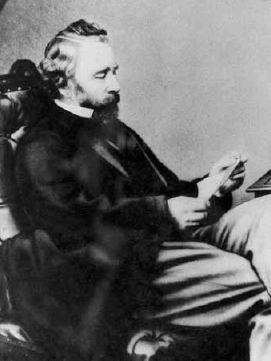Difference between revisions of "Journal of Discourses"
| (3 intermediate revisions by the same user not shown) | |||
| Line 1: | Line 1: | ||
[[image: Mormon_George_D._Watt.gif|200px|left|alt=Mormon Recorder George D. Watt|Mormon Recorder George D. Watt]]The [[Journal of Discourses]] began as a sixteen-page semimonthly publication that members of [http://comeuntochrist.org The Church of Jesus Christ of Latter-day Saints] could subscribe to. It was first privately printed in Liverpool, England, from the years 1854-1886 and its purpose was to inform members of events and sermons given by Church leaders. Most of the members in England did not have access to Church news through any source other than the ''Journal of Discourses''. | [[image: Mormon_George_D._Watt.gif|200px|left|alt=Mormon Recorder George D. Watt|Mormon Recorder George D. Watt]]The [[Journal of Discourses]] began as a sixteen-page semimonthly publication that members of [http://comeuntochrist.org The Church of Jesus Christ of Latter-day Saints] could subscribe to. It was first privately printed in Liverpool, England, from the years 1854-1886 and its purpose was to inform members of events and sermons given by Church leaders. Most of the members in England did not have access to Church news through any source other than the ''Journal of Discourses''. | ||
| − | George D. Watt was a convert to the Church from England. In 1842 he immigrated to the United States and eventually lived in Salt Lake City. He had learned Pitman shorthand, and he used shorthand to record conference talks and even the trial of those accused to be the murderers of [[Joseph Smith]]. In 1852 he began transcribing for the ''Deseret News''. He was paid little for this service and asked if he might privately publish a selection of the sermons as a subscription to those who could not receive the ''Deseret News''. [[Brigham Young]] felt it was a good idea and told him to go ahead and begin printing. | + | [[George D. Watt]] was a convert to the Church from England. In 1842 he immigrated to the United States and eventually lived in Salt Lake City. He had learned Pitman shorthand, and he used shorthand to record conference talks and even the trial of those accused to be the murderers of [[Joseph Smith]]. In 1852 he began transcribing for the ''Deseret News''. He was paid little for this service and asked if he might privately publish a selection of the sermons as a subscription to those who could not receive the ''Deseret News''. [[Brigham Young]] felt it was a good idea and told him to go ahead and begin printing. |
George D. Watt ran the printing of the ''Journal of Discourses'' as a one-man show until 1867 when David W. Evans, another English convert, began helping him gather information. The number of reporters grew to include twelve people including George F. Gibbs, a convert from Wales who was also the secretary for the [[First Presidency]], and Brigham Young's daughter Julia Young. | George D. Watt ran the printing of the ''Journal of Discourses'' as a one-man show until 1867 when David W. Evans, another English convert, began helping him gather information. The number of reporters grew to include twelve people including George F. Gibbs, a convert from Wales who was also the secretary for the [[First Presidency]], and Brigham Young's daughter Julia Young. | ||
Latest revision as of 23:15, 15 November 2023
The Journal of Discourses began as a sixteen-page semimonthly publication that members of The Church of Jesus Christ of Latter-day Saints could subscribe to. It was first privately printed in Liverpool, England, from the years 1854-1886 and its purpose was to inform members of events and sermons given by Church leaders. Most of the members in England did not have access to Church news through any source other than the Journal of Discourses.George D. Watt was a convert to the Church from England. In 1842 he immigrated to the United States and eventually lived in Salt Lake City. He had learned Pitman shorthand, and he used shorthand to record conference talks and even the trial of those accused to be the murderers of Joseph Smith. In 1852 he began transcribing for the Deseret News. He was paid little for this service and asked if he might privately publish a selection of the sermons as a subscription to those who could not receive the Deseret News. Brigham Young felt it was a good idea and told him to go ahead and begin printing.
George D. Watt ran the printing of the Journal of Discourses as a one-man show until 1867 when David W. Evans, another English convert, began helping him gather information. The number of reporters grew to include twelve people including George F. Gibbs, a convert from Wales who was also the secretary for the First Presidency, and Brigham Young's daughter Julia Young.
The information printed in the Journal of Discourses most often included sermons of Church leaders, but it was never expected to contain official doctrine or statements of the Church. Its content was generally considered to be more like a newspaper. For example, some of the items printed in the Journal of Discourses included a prayer given at a cornerstone laying ceremony for the Salt Lake Temple, a report of a high council court decision, information about a murder trial, and even a funeral speech.
The Journal of Discourses have been put together in 26 volumes, divided by year, and are often referred to by the Church when speaking of historical facts. The collected works contains 1,438 speeches in all. These speeches were from presidents of the Church, apostles, members of the Seventy, and other notable people of the time. Many people falsely believe that the Journal of Discourses was written by Brigham Young. Brigham Young did, however, contribute 390 sermons to the Journal of Discourses. Other people who contributed of note are: John Taylor who had 162 of his speeches included, Orson Pratt (127), Heber C. Kimball (113), and George Q. Cannon (111).
